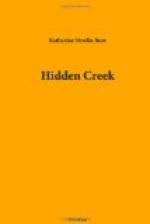Hilliard’s black hair was powdered with dust; his olive face was gray; dust lay thick in the folds of his neck-handkerchief; his pony matched the gray-white road and plodded wearily, coughing and tossing his head in misery from the nose-flies, the horse-flies, the mosquitoes, a swarm of small, tormenting presences. His rider seemed to be charmed into patience, and yet his aquiline face was not the face of a patient man. It was young in a keen, hard fashion; the mouth and eyes were those of a Spanish-American mother, golden eyes and a mouth originally beautiful, soft, and cruel, which had been tightened and straightened by a man’s will and experience. It had been used so often for careless, humorous smiling that the cruelty had been almost worked out of it. Almost, not altogether. His mother’s blood kept its talons on him. He was Latin and dangerous to look at, for all the big white Anglo-Saxon teeth, the slow, slack, Western American carriage, the guarded and amused expression of the golden eyes. Here was a bundle of racial contradictions, not yet welded, not yet attuned. Perhaps the one consistent, the one solvent, expression was that of alert restlessness. Cosme Hilliard was not happy, was not content, but he was eternally entertained. He was not uplifted by the hopeful illusions proper to his age, but he loved adventure. It was a bitter face, bitter and impatient and unschooled. It seemed to laugh, to expect the worst from life, and not to care greatly if the worst should come. But for such minor matters of dust and thirst and weariness, he had patience. Physically the young man was hard and well-schooled. He rode like a cowboy and carried a cowboy’s rope tied to his saddle. And the rope looked as though it had been used.
Millings, that seemed so close below there through the clear, high atmosphere, was far to reach. The sun had slipped down like a thin, bright coin back of an iron rock before the traveler rode into the town. His pony shied wearily at an automobile and tried to make up his mind to buck, but a light pressure of the spur and a smiling word was enough to change his mind.
“Don’t be a fool, Dusty! You know it’s not worth the trouble. Remember that fifty miles you’ve come to-day!”
The occupants of the motor snapped a camera and hummed away. They had no prevision of being stuck halfway up Crazy Woman’s Hill with no water within fifteen miles, or they wouldn’t have exclaimed so gayly at the beauty and picturesqueness of the tired cowboy.
“He looks like a movie hero, doesn’t he?” said a girl.
“No, ma’am,” protested the Western driver, who had been a chauffeur only for a fortnight and knew considerably less about the insides of his Ford than he did about the insides of Hilliard’s cow-pony. “He ain’t no show. He’s the real thing. Seems like you dudes got things kinder twisted. Things ain’t like shows. Shows is sometimes like things.”
“The real thing” certainly behaved as the real thing would. He rode straight to the nearest saloon and swung out of his saddle. He licked the dust off his lips, looked wistfully at the swinging door, and turned back to his pony.




